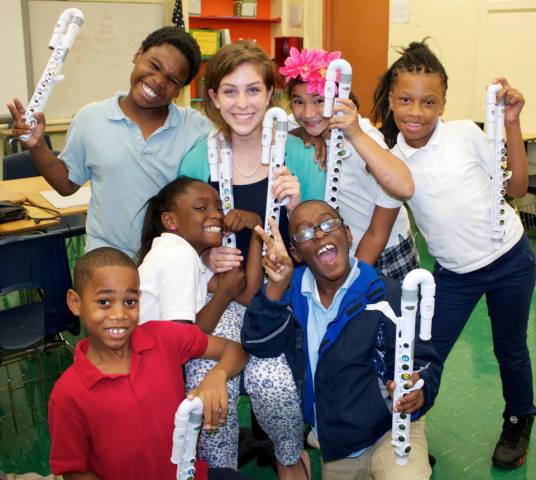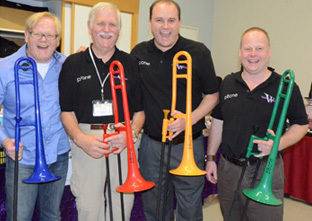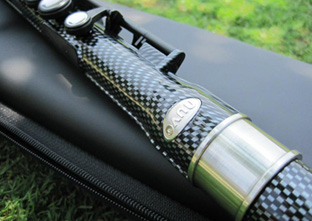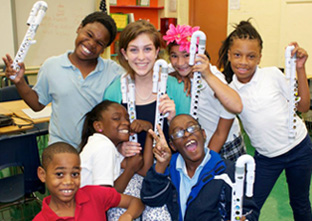Facilitating music learning thanks to plastics

What are the differences between the instruments designed by your companies and those currently manufactured from ABS resin ?
Matt Pope: Warwick Music was founded by trombone players. This explains why it cultivates close ties with this particular category of musicians whose expectations it understands.
In the same way, trombonists form a specific club too. The trombone is also an unique instrument to the extent that it is the simplest of the brass instruments, being made from a single long tube. This is what pushed us to try out using polymer materials on this instrument, such as ABS, which have proven themselves in instrument making.


Max Clissold: There is nothing new in using ABS in the manufacture of clarinets. However, with the Clarinéo and Jflute, Nuvo became the first wind instrument maker to extend the use of polymers to other parts of the instrument than just the body. They have been used for the keywork, the springs and the pads. This has given us a competitive advantage in terms of weight, cost and durability. As a result, both our instruments are composed of 95% of polymer materials and the rest of the components are made from stainless steel. In addition to the ABS used in the body, we use a co-polymer of the polyacetal family (POM) for the mechanisms and moulded silicone for the sealing pads.
Apart from their cost and weight, what other advantages do using plastic materials offer ?
 Matt Pope: In schools, the ABS pBone has definitely proven more durable. This type of trombone can be handed to a young child without worrying about damage to the instrument. Additionally, the resin enables them to be made in different colours, rendering them more aesthetically pleasing, mainly for younger children.
Matt Pope: In schools, the ABS pBone has definitely proven more durable. This type of trombone can be handed to a young child without worrying about damage to the instrument. Additionally, the resin enables them to be made in different colours, rendering them more aesthetically pleasing, mainly for younger children.
Max Clissold: ABS' main advantage is its characteristic durability which makes it a key element in our approach. This plastic is perfectly suited for use in the classroom in which conventional instruments with metallic keywork aren't well-suited at all in many ways.
Our instruments are 100% waterproof! In addition to being able to play in the swimming pool or under the shower, which is pretty rare, plastics have several advantages as concerns matters of hygiene. In schools, our instruments can and will be used by many children, then washed in warm soapy water or disinfected.
ABS' mechanical properties are also perfectly compatible with the other polymer used for the keywork, therefore ensuring that maintenance can be carried out with the greatest of ease. As a result, our instruments no longer require a high skill level in order to make adjustments and repairs. Each of the Nuvo instruments' mechanical components is easy to replace.

How are they different from conventional instruments ?
 Matt Pope: There are obviously significant differences between our plastic pBone and a brass trombone in terms of design and particularly manufacturing. From a musician's point of view, however, the pBone is a proper trombone. Although it does have certain advantages: its weight, its affordable price and its durability. And, of course, the extra fun all of that entails.
Matt Pope: There are obviously significant differences between our plastic pBone and a brass trombone in terms of design and particularly manufacturing. From a musician's point of view, however, the pBone is a proper trombone. Although it does have certain advantages: its weight, its affordable price and its durability. And, of course, the extra fun all of that entails.
 Max Clissold: The acoustic performance of the Nuvo flute and the Clarinéo is very close to that of traditional instruments because the sound is created, for 99% of it, by the vibrations of the column of air in the tube and not by the vibrations of the instrument.
Max Clissold: The acoustic performance of the Nuvo flute and the Clarinéo is very close to that of traditional instruments because the sound is created, for 99% of it, by the vibrations of the column of air in the tube and not by the vibrations of the instrument.
Professional musicians who use the Jflute have reported a pleasing "woody" effect while most amateur musicians did not perceive any differences at all.
Our Clarinéo was specially designed for children as it is smaller than a traditional clarinet in Bb. In addition, it is a clarinet in C which does not require transposition. It is perfect for children but could deter some more experienced clarinet players.
How have these instruments been received by musicians ?
Matt Pope: Enthusiastic comments have been flooding in from the musical world. Many musicians, teachers and others are currently the proud owners of a pBone.

 Max Clissold: For many beginner musicians - and their teachers, the Clarinéo offers less stress on the neck and shoulders, making for considerable encouragement to learning the instrument. They are so easy to assemble and take apart that we encourage their owners to take them for playing on all occasions, which is more difficult with a metal flute or a traditional clarinet.
Max Clissold: For many beginner musicians - and their teachers, the Clarinéo offers less stress on the neck and shoulders, making for considerable encouragement to learning the instrument. They are so easy to assemble and take apart that we encourage their owners to take them for playing on all occasions, which is more difficult with a metal flute or a traditional clarinet.
Who uses these instruments? How many musicians use them? In which countries ?
 Matt Pope: We have already sold 100,000 pBone units throughout the world, to schools, or directly to musicians. Although many of our customers are beginners, many of them are professionals, namely teachers. Trombone players are using the pBone in America, Japan and Europe, of course.
Matt Pope: We have already sold 100,000 pBone units throughout the world, to schools, or directly to musicians. Although many of our customers are beginners, many of them are professionals, namely teachers. Trombone players are using the pBone in America, Japan and Europe, of course.
Max Clissold: Nuvo has distributed approximately 45,000 instruments throughout the world. The Clarinéo is mainly used by children in the United Kingdom and Europe. The clarinet is as popular as our Jflute in Japan, where both instruments are used by children and adults alike. Nuvo also has a presence in America. The "Best Tools for Schools" award, which is given out for innovation in musical instruments for schools, greatly facilitated our presence in the United States, Canada, and Latin America.

Do you plan to create other instruments based on this model ?
 Matt Pope: We are gearing up to the launch of the pTrumpet which will be available to buy in 2014. After that, we have plans for various brass and wind instruments. It's the next logical step. "We want to teach the world to play," that is Warwick Music's vocation.
Matt Pope: We are gearing up to the launch of the pTrumpet which will be available to buy in 2014. After that, we have plans for various brass and wind instruments. It's the next logical step. "We want to teach the world to play," that is Warwick Music's vocation.
 Max Clissold: Yes, we are currently designing other woodwind instruments, like the Clarinéo, but also brass instruments. We are also looking at string instruments.
Max Clissold: Yes, we are currently designing other woodwind instruments, like the Clarinéo, but also brass instruments. We are also looking at string instruments.
Nuvo aims to make learning music easier through efficient technologies and materials combined with innovative design. Speaking of which, I believe that plastics constitute a fantastic springboard for achieving our aim.





